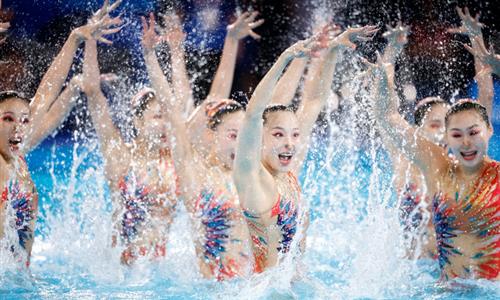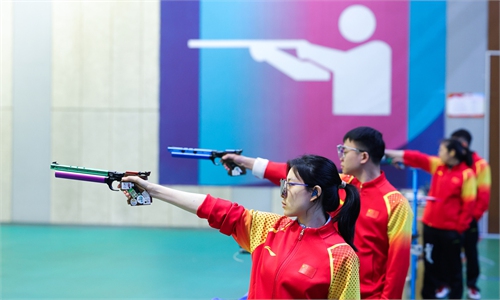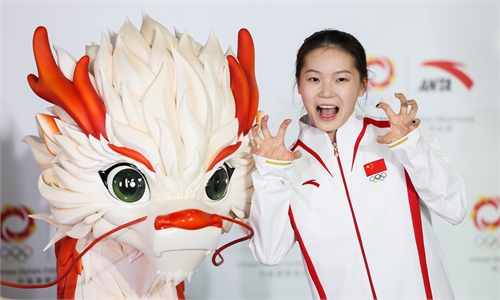SPORT / OLYMPICS
Glory and growth: Team China’s groundbreaking success at Paris Olympics
Team China’s groundbreaking success at Paris Olympics
Editor's Note:
Team China concluded their Paris Olympics campaign with 40 gold, 27 silver, and 24 bronze medals, marking their best performance at an Olympics held abroad.
In diving and table tennis, the Chinese players achieved a landmark sweep of eight and five gold medals respectively across all categories, a rare achievement for the teams at a single Olympics.
As the Olympics concluded on Sunday, Global Times reporters Jiang Li, Wu Jie, Li Yuche and Lu Wenao picked up several stories behind the scenes that can help you remember the glory and sportsmanship displayed in Paris.
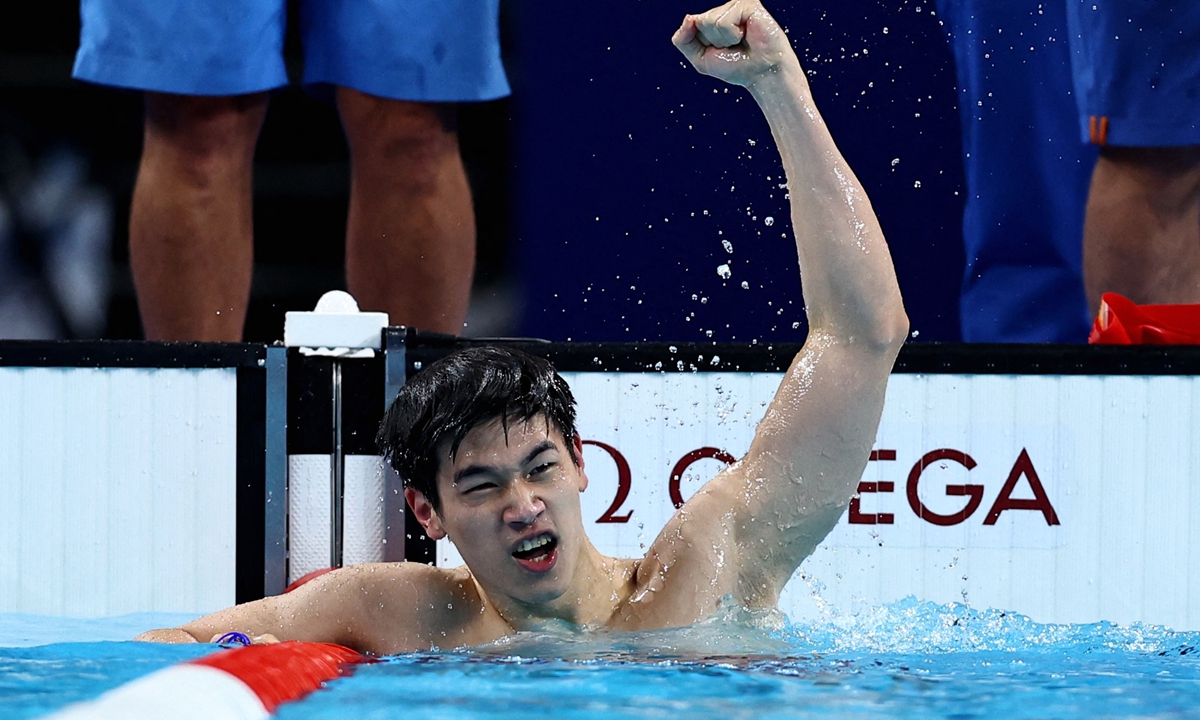
Pan Zhanle celebrates after winning the men's 100-meter freestyle final at the Paris Olympics on July 31, 2024. Photo: IC
Among the big contributors to the Chinese delegation's medal haul, the Chinese swim team concluded their campaign at the 2024 Paris Olympics with two golds, three silvers, and seven bronzes. Totaling 12 medals, this marks the highest number ever achieved by the Chinese swim team in Olympic history.This was a hard-earned result for the team, considering the Chinese swimmers had undergone excessive doping tests ahead of and during the Paris Olympics, which many believe disrupted Chinese swimmers' preparations.
Prior to and during the Games, some US institutions and media stirred controversy over alleged doping issues with Chinese swimmers.
According to the World Aquatics, since January, Chinese swimmers have undergone an average of 21 drug tests per athlete, compared with four for Australian swimmers and six for US swimmers.
Chinese swimmer Pan Zhanle's sensational gold medal in the men's 100m freestyle helped the team shrug off anxiety.
On July 28, Pan won gold with a world record setting time of 46.40 seconds. This victory marked the first time a Chinese male swimmer won a gold medal in the 100m freestyle at the Olympics.
"This gold medal is very significant for our country, as it represents a historic breakthrough in a new event for Chinese swimming. It's a very exciting achievement," Pan said after the race.
Notably, Pan had revealed in an interview before heading to Paris that he was already capable of swimming under 46.5 seconds but wanted to avoid exposing his true strength too early.
"Fortunately, at the world championships I swam to 46.80 seconds, so my competitors thought that was my limit - it was a smokescreen," Pan said.
Adding to Pan's gold medal, male backstroke swimmer Xu Jiayu won silver in the men's 100m backstroke with a time of 52.32 seconds and female breaststroker Tang Qianting won silver in the women's 100m breaststroke with a time of 1:05.54 on July 30.
In the mixed 4x100m medley relay final on August 4, the Chinese team, consisting of Xu, Qin Haiyang, Zhang Yufei and Yang Junxuan, won silver with a time of 3:37.55, breaking the Asian record and finishing just 0.12 seconds behind the US team.
In the men's 4x100m medley relay, backstroker Xu, breaststroker Qin, butterflyer Sun Jiajun and freestyle star Pan ended 40 years of US dominance since the 1984 Olympics with a sensational 3:27.46.
"I've lost count of how many tests I've undergone. Often, I'm called for testing as early as 6 am, which has definitely affected the rhythm of our overall preparation," said Qin following the 4x100m medley relay final.
Following the men's relay final, the Chinese women's team, featuring Wan Letian, Tang Qianting, Zhang and Yang, secured a bronze medal in the women's 4x100m medley relay final.
A notable moment occurred during the group photo session after the men's 4x100m medley relay.
When taking a group photo at the award ceremony after the relay, the Chinese team originally planned to sit down, but the US team members took the initiative to signal the champions should stand on top. The US team sat down with the French team, and then all team members shook hands and hugged each other.
It's said that the best way to earn respect is through undeniable performance. The impressive performance of the Chinese swim team not only secured medals but also strongly countered doubts.
Culture-powered breakthroughs
Chinese athletes have made a string of historic achievements at the Paris Olympic Games, marking the country's growing competitiveness in a broader spectrum of sports and leaving a powerful legacy for youths in China.
Zheng Qinwen, 21, made history by becoming the first Asia-born player to win a gold medal in the Olympic tennis singles event. Her victory is especially significant as tennis has traditionally been a sport dominated by Western players. Zheng's ground-breaking victory reflects China's growing prowess in a wider range of sports and is sure to inspire the younger generation of tennis players.
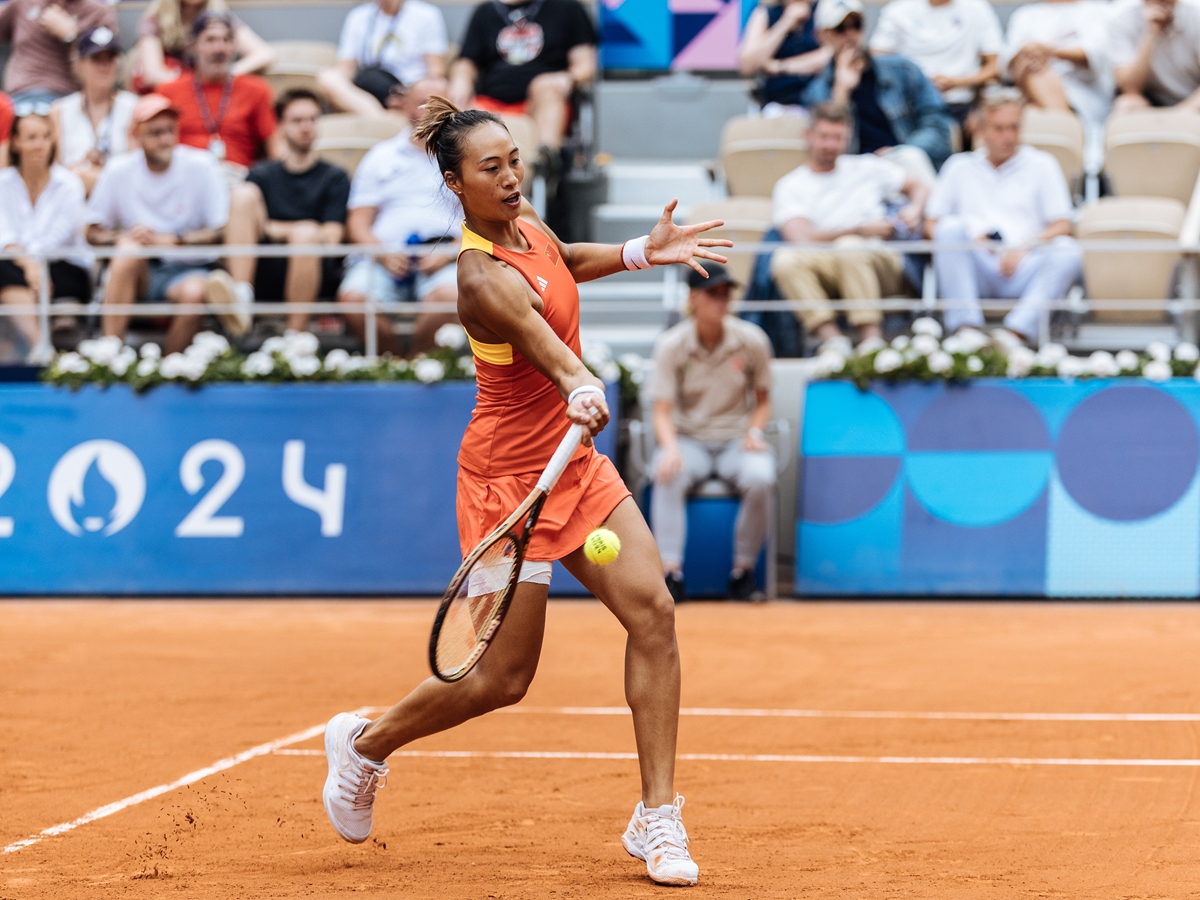
Zheng Qinwen returns to Croatia's Donna Vekic during the women's singles final tennis match at the Paris Olympics on August 3, 2024. Photo: Li Hao/GT
As Zheng withdrew from the tennis mixed doubles event to focus on singles, Wang Xinyu paired up with Zhang Zhizhen right before the mixed doubles event began. In only four days, this interim duo secured a silver medal in China's first attempt in the Olympic mixed doubles.Deng Yawen, an 18-year-old Chinese BMX prodigy, chalked up a historic victory in the women's BMX freestyle park finals. Her stunning performance, scoring 92.60 points in her best run, not only secured China's first-ever gold medal in this event but also highlighted the rapid development of BMX as a sport in China. Deng's victory is particularly significant given that BMX freestyle is a relatively new discipline in the Olympics, having debuted in Tokyo 2020.
China's artistic swimming head coach Zhang Xiaohuan said she felt it was "a bit unreal" when China won its first-ever Olympic gold medal in artistic swimming with a fluid acrobatic team routine. Wang Liuyi and Wang Qianyi also secured China's first Olympic title in artistic swimming's duet free routine. Zhang attributed the milestone triumph to generations of effort.
"We have shed blood, sweat and tears, but in the end, we all held on. This is the result of the collective effort of the team and the relentless pursuit of generations of Chinese synchronized swimmers," said Zhang.
Zhang noted that one of the key reasons for Chinese team's breakthroughs was their commitment to incorporating Chinese cultural elements into their performance. For example, they used movements from the martial art Wing Chun and created a visual representation of the Chinese oracle bone script character for "mountain."
"As a non-English-speaking country, it's incredibly challenging for China to achieve a breakthrough in this sport, which has long been dominated by Western countries. Gaining global recognition is no small feat. We will continue on this path, showcasing more elements of Chinese culture and expressing our cultural confidence to the world," she said.
On Friday, China's women's hockey team took silver after a tense 3-1 shootout defeat to the Netherlands, equaling the team's best Olympic record set during the Beijing 2008 Olympic Games.
The Chinese women's rugby team has also achieved their best-ever performance at the Olympics with a 6th place finish.
These achievements are significant as they highlight China's growing competitiveness in global sports beyond their traditional strongholds like table tennis and diving. The success of younger athletes in these diverse disciplines reflects the country's investment in broadening its athletic capabilities and signifies a new era of Chinese sportsmanship on the world stage.
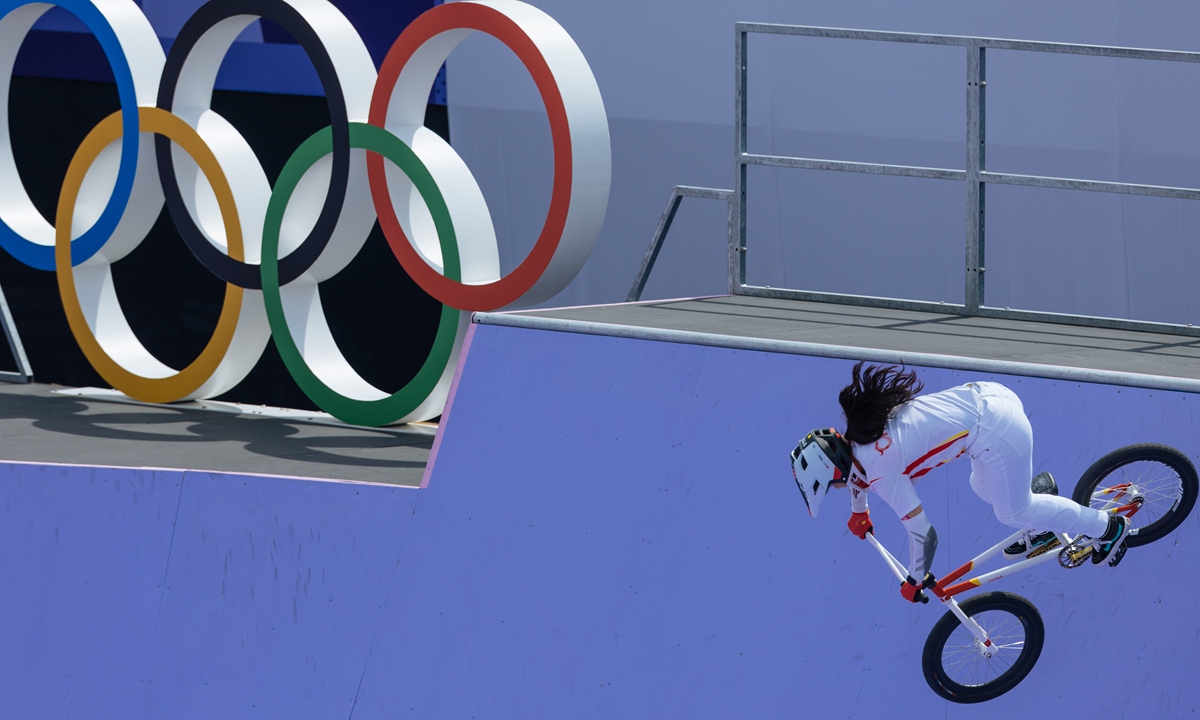
Deng Yawen competes in the women's cycling BMX freestyle park final at the Paris Olympics on July 31, 2024. Photo: Li Hao/GT
Moments of Olympism
Whether it's Chinese player He Bingjiao displaying a Spain flag pin on the podium or weightlifter Shi Zhiyong competing on-site while injured, Chinese athletes at the Paris Olympic Games have shown the true sportsmanship, making sports a channel to convey the human spirit.
China's two-time Olympic champion Shi created a poignant memory in Paris on Friday. Competing in the men's 73kg category, he failed his three attempts to lift 191 kilograms. Behind his "failure," it turns out the athlete had torn his adductor muscle during the competition.
In a post-match interview, Shi teared up as he said he was "very sorry for the whole team" and that he "did not expect things to end like this." His words and resilience inspired numerous Chinese netizens to flock to social media platform Sina Weibo to express their love. One netizen noted that "his courage weighs a thousand pounds."
Shi failed to win any medals, marking a departure from his previous Olympic successes in Rio de Janeiro and Tokyo. However, his regrets in Paris highlight the invisible physical toll that athletes endure.
Chinese netizens' attitude of showing understanding toward an athlete's loss has commonly been seen during the 2024 Paris Olympic Games.
Another example was the encouragements sent to Chinese men's gymnastics team, especially to the 24-year-old Su Weide after he fell from the horizontal bar down twice.
"Losing a gold medal in the gymnastics finals is generally unacceptable to us because we are so good at it, but I'll accept Su's mistake because for a true fan like me, I prioritize our athletes than any results," Li Yang, a sport fan, told the Global Times.
Besides Su, sports fans were also much more light-hearted in expressing their support rather than blame after Tokyo Games champion fencer Sun Yiwen was eliminated in the Round of 32 in Paris.
Chinese fans' growing tolerance toward these setbacks reveals the public are more than ever "wanting to be a part of sports" as well as "reflecting more deeply on sports values," cultural sociologist Xu Shuming told the Global Times.
"Friendship" might be one of these "sports values" that Chinese athletes have shown in Paris.
To show her support for Spanish badminton player Carolina Marin, who forfeited her semi-final match due to a knee injury, China's silver medalist He Bingjiao brought a pin with the Spanish flag onto the medal podium.
Although the pin was difficult to see pinched between He's fingers, the Chinese athlete's gesture was timeless and what one netizen called on Sina Weibo "a gesture of the Olympic spirit."
